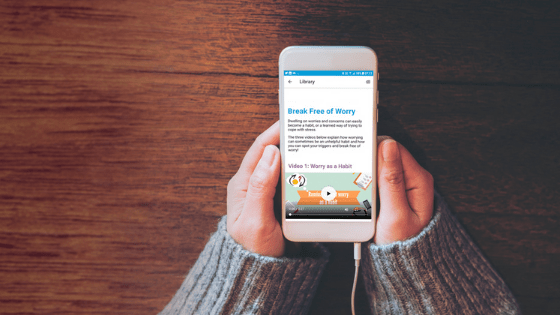
A smartphone app that supports online therapy
Monsenso offers a smartphone app that supports online therapy by enabling users to share valuable health data with their therapists in real-time.
What is online therapy used for?
Online therapy, also called e-therapy or teletherapy has many advantages and it gives users access to therapy services offered by mental healthcare providers from the comfort of their home. Therapists can use one of the many secure platforms available to connect with their patients through video conference, phone calls or chat functionality. It also helps reach people who have very busy schedules and can’t spare the commute, or those are not too comfortable with face to face appointments.
Online therapy can be effective to treat many mood and behavioural disorders such as depression, anxiety, bipolar disorder and borderline personality disorder. In fact, according to research led by McMaster University online therapy can be more effective than in person.
Just as in traditional therapy, it is important that the goals of online therapy are created by both, the therapist and the client.
Online Cognitive Behavioural Therapy
Cognitive behavioral therapy (CBT) is a tool used to treat a number of mental and physical health issues, and due to its flexibility, CBT online offers many of the benefits found in the face-to-face model. CBT is widely available online, so people experiencing unwanted symptoms linked to anxiety, depression, and other conditions should view it as a viable option to treat their overall well-being.
Online Dialectical Behavioural Therapy
Dialectical Behavioural Therapy (DBT) is a type of therapy that primarily involves skills training such as mindfulness, emotional regulation, and distress tolerance to assist individuals to better manage emotional distress. It also provides problem-solving strategies to identify and alter harmful behaviors and replace them with constructive ones.
An app that supports online treatment
Before using the Monsenso smartphone app to support his therapy, Peter Hagelund, followed the typical therapeutic setting. His psychiatrist would schedule an appointment every two-three weeks, and they would discuss Peter’s previous weeks. On most occasions, Peter would say that he had been doing fine, but sometimes he forgot important details that he wanted to discuss.
Now, instead of relying on Peter’s memory during the consultation, his psychiatrist can access his data and see how he has been doing, as it happened. He can view how much he has sleept, how much he exercises, how much he drinks, the levels of anxiety he has, and other relevant aspects to his treatment and his disorder.
Mads Trier-Blom, another Monsenso user, said that the app helps him to be more connected with his clinician, Bente, who intervenes when she can see that he is not feeling well, to help him avoid having an episode.
Psychiatrist Kristoffer Södersten from PsykiatriResurs in Sweden says that the accuracy from a diagnosis obtained can very much depend on many factors such as cultural background and how comfortable the patient is in the conversation. Therefore, it can be very arbitrary the diagnosis a patient receives.
The information gathered from the Monsenso smartphone app helps him get a consistent and clearer view of an individual’s mental health. He finds the Monsenso mHealth solution to be particularly helpful in capturing relevant objective data. The solution provides a comprehensive and easily accessible overview of relevant patient data, such as the individual’s overall day score, his mood, the number of hours he slept, and if he took his medication. The smartphone app also collects sensor data, such as physical activity, social activity, phone usage and voice features which helps to supplement the subjective data provided.
The Monsenso mHealth solution has helped mental healthcare providers to get an overview of an individual’s historical data and correlation analysis. It also helps them identify the triggers and early warning signs everyone has, enabling them to intervene at an early stage before they have an episode, such as in the case of Mads.
Besides, the smartphone app helps users to be more aware of their mood, their symptoms and the reason why these symptoms appear. It also provides them with useful skill-training content to help them deal with stressful situations.
